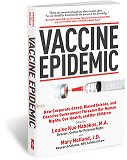Japan Halts HPV Shot for Girls over Safety Issues
Japanese health officials have recorded nearly 2,000 adverse reactions—hundreds of them serious—in girls who got a dangerous U.S. government-backed cervical cancer vaccine that’s also been linked to thousands of debilitating side effects in this country.
The alarming reports have led Japan’s government to take action, suspending recommendation for the controversial vaccine which is billed as a miracle shot that can prevent certain strains of cervical cancer caused by Human Papillomavirus (HPV). The U.S. government has taken the opposite approach amid equally alarming cases of serious side effects. Not only does the Obama administration continue recommending the vaccine (Gardasil), it spends large sums of taxpayer dollars promoting it and works hard to keep details involving its dangers secret.
Judicial Watch has reported extensively on this and uncovered droves of government records that show Gardasil has been linked to seizures, blindness, paralysis, speech problems, pancreatitis, short-term memory loss and dozens of deaths. Incredibly, the Food and Drug Administration (FDA) fast-tracked Gardasil’s approval and the Centers for Disease Control and Prevention (CDC) recommends it for girls starting at age 9. JW has investigated the Gardasil scandal since 2007 and had to sue for the records in the face of Obama administration stonewalling. Read JW’s special report detailing Gardasil’s government approval process, side effects, safety concerns and marketing practices.
Continue Reading this article here.
Japan withdraws support of controversial HPV vaccine over safety concerns
by Thaddeus Baklinski
lifesitenews.com
Excerpts:
While jurisdictions throughout the Western world continue to promote the HPV vaccine, the Japanese government has pulled its support of the controversial drug and sent formal notifications to local health officials saying that it should not be administered until safety concerns are investigated.
Japan acted on a report by Japanese internist and cardiologist, Dr. Sataro Sato, who revealed that since the vaccine was introduced in 2010, almost 2,000 adverse events were reported to the country’s Vaccine Adverse Reactions Review Committee, including 358 cases that were evaluated as serious.
Dr. Sato wrote that the manufacturers of Gardasil and Cervarix state in their own documentation that their vaccines may cause seizures and/or brain damage.
Dr. Sato’s report notes that parents of vaccine victims began calling the country’s health minister and furnishing videos in which girls who had received the HPV vaccine suffered from walking disturbances, body tics and seizures. In other cases girls injected with the vaccine lost consciousness and fell to the floor, suffering head or face injuries.
As evidence of serious adverse reactions to the drugs – such as seizures, blindness, paralysis, speech problems, pancreatitis, Guillain-Barré Syndrome, and death – began to mount, a national organization, the Nationwide Liaison Association of Cervical Cancer Vaccine Victims and Parents was formed to stop the distribution of the drugs to the children of unsuspecting families.
One of the case reports that Dr. Sato attributes to reaction to the HPV vaccine was that of a junior high school girl who, on the 6th day after injection, suffered cardiac and pulmonary arrest after running a relay in training for a sports festival at school. The girl had no record of previous illness.
“CPR was successful by ambulance team at school and by doctors in a hospital. But severe brain damage occurred. She went on to an artificial respirator for one week,” Dr. Sato reported.
Dr. Sato concluded that the negative health effects of Gardasil and Cervarix are serious and that long-term consequences are not well understood, noting that, “vaccine manufacturers have an obligation of post-licensure vigilance.”
Cervical cancer vaccination probe kicks off
Two groups set up by the health ministry have started full-scale studies of whether cervical cancer vaccines are directly linked to severe pain that has affected some young women.
The two groups will collect data through clinical studies at 17 hospitals nationwide. The group led by Shinshu University professor Shuichi Ikeda will extend its studies to cerebral and neural areas, while the other, headed by Aichi Medical University professor Takahiro Ushida, will seek ways of easing the pain through cognitive behavioral therapy, as well as look into the causes.
The Ministry of Health, Labor and Welfare started recommending in April that girls between the sixth grade and the first year of high school be given cervical cancer vaccines under a free vaccination program. However, the ministry suspended the recommendation in June following reports of adverse reactions.
There were 155.7 reports of side effects per million for one of the vaccinations, and 245.1 for the other. This is 20 to 30 times higher than for flu vaccines.
See Also:
Study: HPV Vaccine Linked to Premature Menopause in Young Girls
Vaccine Epidemic
by Louise Kuo Habakus and Mary Holland J.D.
FREE Shipping Available!






